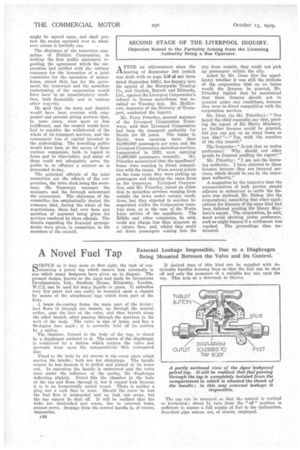SECOND STAGE OF THE LIVERPOOL INQUIRY.
Page 82

If you've noticed an error in this article please click here to report it so we can fix it.
Objection Raised to the Partiality Arising from the Licensing Authority Being a Bus Operator.
AFTER an adjournment since the hearing of September 3rd (which was dealt with on page 1.18 of our issue dated September loth), be inquiry into the appeal of the Merseyside Touring Co., and Garlick, Burrell and Edwards, Ltd., against the Liverpool Corporation's refusal to license motorbuses was resumed on Tuesday last. Mr. McMorrow, inspector of the Ministry of Transport, conducted the inquiry.
Mr. Percy Priestley, general manager of the Liverpool Corporation Tramways, said that Liverpool Corporation had been the transport authority for Bootle for 30 years. The trains in Bootle were carrying more than 43,000,000 passengers per year, and the Liverpool Corporation motorbus services, inaugurated in 1923, were carrying
11,000,000 passengers annually. Mr. Priestley maintained that the appellants' buses were running in direct competition with the trains. From several points on the tram route they were picking up passengers and charging the same fares as the tramways. Liverpool Corpora,. tion, said Mr. Priestley, raised no objection to motorbus services running from outside the town under certain condi:. lions, but they objected to services inaugurated within the Corporation tramway area, as in the case of the Watts Lane service of the appellants. The Ribble and other companies, he said, could not charge less than sixpence as a return fare, and, whilst they could set down passengers coming into the
city from outside, they could not pick up passengers within the city.
Asked by Mr. Dean (for the appellants) whether it was still the attitude of the corporation that on no terms would the licences be granted, Mr. Priestley replied that he maintained that these licences should not be granted under any conditions, because they were in direct competition with the corporation services.
Mr. Dean (to Mr. Priestley) : " You heard the chief constable say that, pending the report of Sir Henry Maybury, no further licences would be granted, but you can put on as many buses as you like? "—" Yes, with the sanction of the city council."
The Inspector : "Is not that an undue preference? Why should not other Reople be licensed pending the report?" Mr. Priestley : "I am not the licensing authority. I have objected to these licences because they are internal services, which should he run by the transport authority."
A suggestion by the inspector that the representatives of both parties should adjourn to endeavour to settle the clis-. pute was declined, Mr. Bishop (for the corporation) remarking that other applications for licences of the same kind had been deferred pending Sir Henry Maybury's report. The Corporation, he said, must avoid showing undue preference, such as might happen if a settlement was reached. The proceedings then terminated.




























































































































